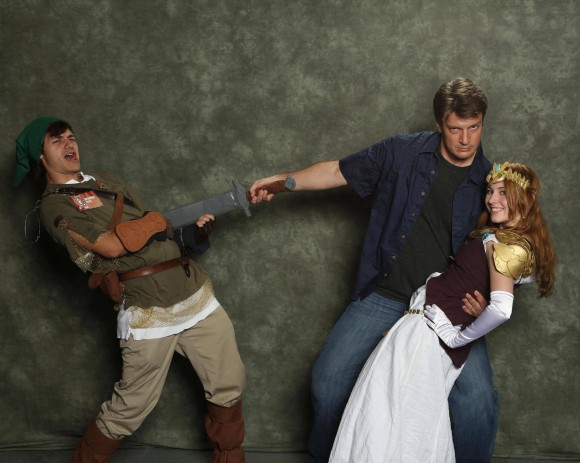Pilgrimage
to San Diego: Reflections on a Changing Comic-Con
By Alexis
George
Sitting in
the Legends of San Francisco Bar
in SFO, I look up to see ESPN playing on the LG television. The
Headline of the off game broadcast reads Women
Covering Sports: How Far We’ve Come.
Across the bar, two older women talk about the difference between
Superman Returns
and Man of Steel.
I have been
in the airport roughly twenty minutes, and so far I’ve seen three
recycled Warner Bros. bags, one poster tube, and two exhausted
couples clad in nerd shirts waiting on the flight to San Diego.
This is my
10th
year in a row headed to Comic-Con (11th
if you count the 1 day visit when I was twelve and spent the whole
day looming over used Manga books in the Exhibit hall). If you know
anything about the massive Pop Culture Convention, you know things
have changed. Comics no longer reign as the kingpin of entertainment.
Where posters for superhero adaptations once hung, banners promoting
HBO’s Game of Thrones and
the CW’s Vampire Diaries now
proudly wave. Men in Green Lantern shirts hold up cardboard signs
with phrases like “Scream if Twilight Ruined Comic-Con!” Dungeons
and Dragons and fantasy novels
are cool now. The time of the closeted geek is over.
 |
| That's right, WE'RE the cool kids now. -Ed |
This time
last year, I was sitting across from a woman in her seventies talking
about the early years of SDCC. She had been making the pilgrimage to
San Diego almost three decades straight, and spent the duration of
the delayed flight telling me about the days long before Hall H, when
you could walk up to Ray Bradbury and shake his hand. As I wait for
my current delayed flight, I look over emails from two weeks ago
where my friend has already plotted camping out overnight for
Ballroom 20. I briefly reminisce about last year’s overnight
campouts, where I watched The
Mighty Boosh with strangers at
2am while waiting for the Doctor Who panel.
Comic-con has become an experiment in insanity. To truly commit to the full experience, by the end of day four is to risk, anxiety, exhaustion and the vague feeling of having joined the legions of undead in a Max Brooks novel. It means never complaining about the length of a line again. It means never questioning your commitment to getting into a midnight movie, or being the first in line at a book release. Simon Pegg once said, "Being a geek is all about being honest about what you enjoy, and not being afraid to demonstrate that affection. It means never having to play it cool about how much you like something. It's basically a license to proudly emote on a somewhat childish level, rather than behave like a supposed adult. Being a geek is extremely liberating." Comic-con is all about that.
Now the general consensus is that Comic-con has become a monster of a thing, completely out of control and in need of a stark renovation. There are too many people, too small a space, too incompetent a staff, and the focus of the event has been lost in a sea of industry. All of this is true. (Except maybe the bit about the staff - Ed.) But I don't think the changes have been all bad.
I remember the isolation of being a geek at a young age: Having peers sneak into my locker at summer camp and smear dirt and gum into my anime sketchbooks. (1) Being bullied for wanting to play Pokemon and talk about Dragon Ball Z instead of playing tag. I remember the absolute solace of meeting a girl who played D&D, and who liked Inuyasha, too. I remember the day she told me about Comic-con, an event (2) where thousands of people got together to bask in all things otherwise publicly disdained. I remember excitedly telling my Dad on the way home from camp that day, and hearing, "Maybe you'll go one day,(3) Alexis."
Now, a decade later, I'm in an airport, overhearing a man ask his daughter, "Which giant robot was your favorite?"
 |
| I hope it was this one. -Ed |
I’m not
saying Comic-Con changed the way the public reacts to geek culture.
But if it’s any sort of refection on public approach to geek
enthusiasm, if people are complaining that the panels are too crowded
and the limited edition Hellboy
figurines are selling too fast,
if the frequent SDCC goers have problems with including a larger
population of passionate fans into their exclusive club, then
something was forgotten along the way. We should be excited that our
geeky worlds have grown larger. It means a larger variety of geeks
from every ethnicity and gender. It means more media will be
generated and produced for everyone to enjoy. It means that maybe,
just maybe, a few less kids are going to find gum and dirt in their
lockers.
All this is
coming from someone who only managed to buy Thursday and Sunday
passes before everything else sold out.
1
Yeah, I was that geek. It’s rare when I so much as watch an
episode of anime anymore, but put on a good Cowboy Bebop episode
and you might get me in the mood again.
2
Read: A safe haven.
3
Let it be known my father is just as enthusiastic about the event as
I am. He’s not beyond camping overnight to See Doctor Who,
while discussing his ideas of what Firefly season 2 might
have looked like. Though he does still call him Josh Whedon.
No comments:
Post a Comment